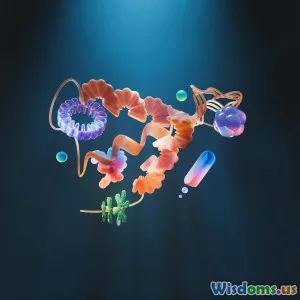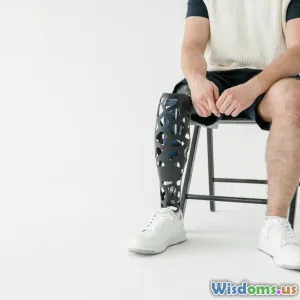
The Intersection of Science and Health Innovations
5 min read Explore how science and technology are revolutionizing healthcare through innovative solutions and advancements. (0 Reviews)
The Intersection of Science and Health Innovations
In recent years, the confluence of science and technology has birthed a new era in healthcare, characterized by groundbreaking innovations that are transforming the way we diagnose, treat, and manage diseases. This article delves into key advancements in this dynamic field, exploring how they enhance patient care and outcomes.
The Role of Biotechnology
Biotechnology has emerged as a significant driver of health innovations. Through genetic engineering and molecular biology, scientists have developed targeted therapies that address the root causes of diseases. For instance, CAR-T cell therapy is a revolutionary treatment for certain types of cancer, utilizing genetically modified T cells from the patient to attack cancer cells more effectively. The personalized nature of this approach not only improves efficacy but also minimizes side effects compared to traditional treatments.
Artificial Intelligence in Healthcare
Artificial intelligence (AI) is another pivotal innovation reshaping health care. AI algorithms are increasingly being used for predictive analytics, enabling healthcare providers to identify at-risk patients and intervene early. For example, machine learning models can analyze vast datasets to predict patient deterioration or the likelihood of developing chronic diseases, allowing for timely preventative measures. Furthermore, AI-powered diagnostic tools, such as imaging analysis software, enhance the accuracy of diagnoses, leading to better treatment plans.
Telemedicine: Bridging Gaps in Access
Telemedicine has gained significant traction, especially in the wake of the COVID-19 pandemic. It offers a convenient solution for patients to access healthcare services from the comfort of their homes. Video consultations, remote monitoring, and mobile health applications are empowering patients to manage their health proactively. This innovation has proven particularly beneficial for individuals in rural and underserved areas, ensuring they receive timely medical attention without the barriers of distance.
Wearable Health Technology
Wearable devices, such as fitness trackers and smartwatches, are revolutionizing personal health management. These gadgets monitor vital signs, activity levels, and sleep patterns, providing users with real-time data to optimize their health. Beyond fitness, wearables equipped with advanced sensors can track chronic conditions, alerting users and healthcare providers of any concerning changes. This continuous monitoring fosters a more engaged and informed patient population.
Collaborative Platforms and Big Data
The integration of big data analytics in health care has opened new avenues for research and clinical practice. Collaborative platforms that aggregate health data from diverse sources allow researchers to identify trends and correlations that were previously undetectable. For instance, during the COVID-19 pandemic, data-sharing initiatives enabled rapid development of vaccines and treatments, showcasing the power of collaboration in addressing global health challenges.
Ethical Considerations and Challenges
Despite the myriad benefits of these innovations, ethical considerations remain paramount. Issues such as data privacy, algorithmic bias, and equitable access to technology must be addressed to ensure that advancements in health care serve all populations fairly. Policymakers and stakeholders must engage in ongoing dialogue to navigate these challenges responsibly.
Conclusion
The intersection of science and health innovations is undeniably reshaping the future of healthcare. With advancements in biotechnology, artificial intelligence, telemedicine, wearable technology, and big data, the potential for improved patient outcomes is immense. As we continue to embrace these innovations, it is crucial to remain vigilant about the ethical implications and strive for equitable access to ensure that all individuals benefit from the advancements in healthcare. The journey of integrating science and technology in health care is just beginning, and the possibilities are boundless.
Rate the Post
User Reviews
Popular Posts





















